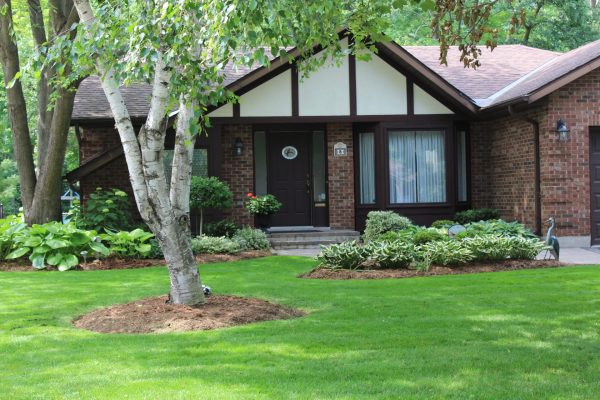Guelph, with its lush green spaces and commitment to sustainability, is an ideal city for creating environmentally-friendly landscapes. Sustainable landscaping not only enhances the beauty of your home but also supports local ecosystems and conserves natural resources. In this blog, we will explore the principles of sustainable landscaping and provide practical tips for creating an eco-friendly garden in Guelph.
Principles of Sustainable Landscaping
- Water Conservation: One of the core principles of sustainable landscaping is water conservation. This involves using water-efficient irrigation systems, selecting drought-tolerant plants, and employing techniques to reduce water runoff and evaporation.
- Soil Health: Healthy soil is the foundation of a sustainable garden. Practices such as composting, mulching, and avoiding chemical fertilizers help maintain soil structure, fertility, and microbial activity.
- Biodiversity: A diverse garden supports a variety of plant and animal species, promoting a balanced ecosystem. Incorporating native plants, providing habitats for wildlife, and avoiding invasive species are key aspects of fostering biodiversity.
- Energy Efficiency: Sustainable landscaping also considers energy efficiency. This can be achieved by strategically placing trees and shrubs to provide shade, reduce heat islands, and lower energy consumption for heating and cooling.
Tips for Sustainable Landscaping in Guelph
- Choose Native Plants: Native plants are well-suited to Guelph’s climate and soil conditions. They require less water and maintenance compared to exotic species. Consider incorporating plants like Eastern Redbud, Wild Bergamot, and Serviceberry into your garden.
- Implement Rain Gardens: Rain gardens are designed to capture and filter rainwater, reducing runoff and promoting groundwater recharge. They are planted with water-tolerant species that thrive in wet conditions, such as Blue Flag Iris and Swamp Milkweed.
- Use Mulch: Mulching helps retain soil moisture, suppress weeds, and regulate soil temperature. Organic mulches like wood chips, straw, and compost also add nutrients to the soil as they decompose.
- Install Drip Irrigation: Drip irrigation systems deliver water directly to the roots of plants, minimizing water waste. They are more efficient than traditional sprinklers and can be easily adjusted to meet the needs of different plants.
- Composting: Composting organic waste from your kitchen and garden reduces the amount of waste sent to landfills and creates nutrient-rich soil. Use compost to enrich your garden soil and improve its structure.
- Plant Trees Strategically: Planting trees in strategic locations can provide shade in the summer and act as windbreaks in the winter, reducing energy costs. Choose native tree species like Sugar Maple, Red Oak, and White Pine.
- Create Wildlife Habitats: Encourage biodiversity by creating habitats for local wildlife. Plant a variety of flowering plants to attract pollinators, install bird feeders and baths, and create sheltered areas for small mammals.
Maintenance Tips for a Sustainable Garden
- Regular Soil Testing: Test your soil regularly to monitor its pH, nutrient levels, and overall health. This will help you make informed decisions about soil amendments and plant choices.
- Organic Pest Control: Use organic methods to control pests and diseases. Introduce beneficial insects, use neem oil or insecticidal soap, and practice crop rotation to keep your garden healthy.
- Water Wisely: Water your garden in the early morning or late evening to reduce evaporation. Use rain barrels to collect and store rainwater for irrigation.
- Reduce Lawn Areas: Lawns require significant water and maintenance. Consider reducing lawn areas and replacing them with native plant beds, ground covers, or permeable paving.
- Seasonal Cleanups: Conduct seasonal cleanups to remove dead plants, leaves, and debris. This helps prevent pests and diseases and keeps your garden looking neat and tidy.
Conclusion
Creating a sustainable landscape in Guelph is not only beneficial for the environment but also enhances the beauty and functionality of your outdoor space. By following the principles of sustainable landscaping and implementing these practical tips, you can develop an eco-friendly garden that supports local ecosystems, conserves resources, and provides a serene retreat for you and your family. Embrace the sustainable gardening practices and contribute to Guelph’s green legacy.



